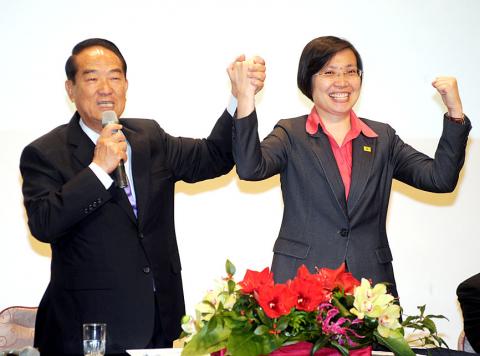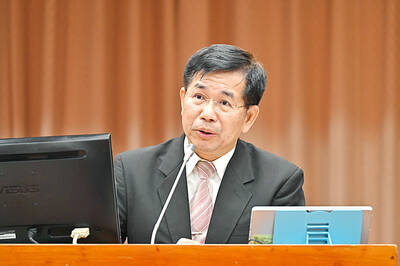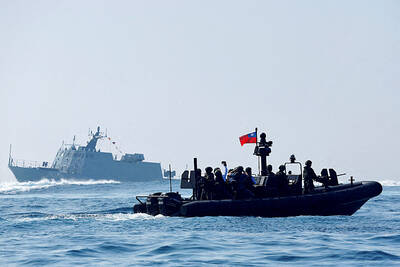People First Party (PFP) presidential candidate James Soong (宋楚瑜) yesterday announced Republican Party chairperson Hsu Hsin-ying (徐欣瑩) will be his running mate in the Jan. 16 election, as part of his campaign promise to form a coalition government.
“As you all can see, there is something different with the tie I wear today,” Soong told a news conference in Taipei while pointing to his light purple tie, an uncommon choice for the PFP chairman who usually wears a tie in the party’s color of orange.
Soong said that only through a concerted effort can the future leader of Taiwan help restore the public’s lost confidence and pride, and create a brighter future for generations to come.

Photo: CNA
“Cooperation does not mean combination, because there is no need to break oneself into pieces just to reach a compromise,” Soong said. “Instead, you should keep being yourself while expanding your mind to accommodate different types of people.”
Soong said his selection of Hsu was driven by four main reasons, including his plan to establish a coalition government if elected president in the hopes of putting an end to divisions between political parties and to forge a shared dream.
“The second reason is the need for future leaders to put down their ‘maximized self’ in the pursuit of public well-being and a joint future for the nation and its people,” Soong said.
Soong said the third reason is Hsu’s expertise in engineering and technology and his admiration for her ability to obtain a doctoral degree in civil engineering from National Chiao Tung University after turning down a scholarship offered by NASA to take care of her ailing mother.
The last reason was that despite her relatively young age, Hsu won the largest number of votes when running for a seat in the Legislative Yuan in 2012 and has made exceptional achievements during her term, Soong said.
“What I admire about Hsu the most is her personality and character. Corruption has been the primary reason people loathe politics, but Hsu is someone who was willing to give up a rare opportunity for her mother and has demonstrated morality and discipline throughout her political career,” Soong said.
“I am as surprised as you are that I am standing here today. In the political environment that I know of, no politicians will have the magnanimity to cooperate with others because they are oftentimes preoccupied with calculations,” Hsu said.
Hsu said Soong once told her that his goal is to help Taiwan, not the party, and that only by giving away can one reap the greatest harvest.
“I was moved by Soong’s words because society is indeed in need of greater tolerance of other people’s ideas and demands,” Hsu said.
“What the nation requires is a leader with governing experience, rather than someone who is to experiment,” she said, adding that Soong is the most reliable and experienced candidate in the race.
Hsu participated in her first election in 2005 when she ran for a post as Hsinchu County councilor. After being defeated in her bid for a legislative post in the city in 2007, she joined the Chinese Nationalist Party (KMT) and was re-elected as Hsinchu County councilor in 2009.
The KMT nominated Hsu as a legislative candidate for the 2012 elections, which she won after garnering 171,466 votes.
Hsu withdrew from the KMT in January, saying Taiwan needed more than just the choice between “blue and green.”
She founded the Republican Party in March, with the stated aims of putting a stop to political wrangling between parties and empowering the nation and its people.

The International Industrial Talents Education Special (INTENSE) Program to attract foreigners to study and work in Taiwan will provide scholarships and a living allowance of up to NT$440,000 per person for two years beginning in August, Minister of Education Pan Wen-chung (潘文忠) told a meeting of the legislature’s Education and Culture Committee yesterday. Pan was giving an update on the program’s implementation, a review of universities’ efforts to recruit international students and promotion of the Taiwan Huayu Bilingual Exchanges of Selected Talent (BEST) program. Each INTENSE Program student would be awarded a scholarship of up to NT$100,000 per year for up to

‘MONEY PIT’: The KMT’s more than NT$2 trillion infrastructure project proposals for eastern Taiwan lack professional input and financial transparency, the DPP said The Democratic Progressive Party (DPP) caucus yesterday said it would ask the Executive Yuan to raise a motion to oppose the Chinese Nationalist Party (KMT) caucus’ infrastructure proposals and prepare to file for a constitutional interpretation if the KMT-dominated legislature forces their passage. The DPP caucus described the three infrastructure plans for transportation links to eastern Taiwan proposed by the KMT as “three money pit projects” that would cost more than NT$2 trillion (US$61.72 billion). It would ask the Executive Yuan to oppose public projects that would drain state financial resources, DPP caucus secretary-general Rosalia Wu (吳思瑤) said. It would also file for

BASIC OPERATIONS: About half a dozen navy ships from both countries took part in the days-long exercise based on the Code for Unplanned Encounters at Sea An unpublicized joint military exercise between Taiwan and the US in the Pacific Ocean last month was carried out in accordance with an international code, the Ministry of National Defense (MND) said yesterday. According to a Reuters report citing four unnamed sources, the two nations’ navies last month conducted joint drills in the Western Pacific. The drills were not made public at the time, but “about half-a-dozen navy ships from both sides, including frigates and supply and support vessels, participated in the days-long exercises,” Reuters reported, citing the sources. The drills were designed to practice “basic” operations such as communications, refueling and resupplies,

SELF-SUFFICIENCY: The project would only be the beginning, as Taiwan needs at least 120 satellites to ensure uninterrupted communication, Wu Tsung-tsong said The Taiwan Space Agency (TASA) yesterday said it plans to launch six low Earth orbit satellites starting in 2026 as part of the government’s plan to boost the resilience of the nation’s communications. The development of the technology gained attention after Ukrainians were able to access the Internet through Space Exploration Technologies Corp (SpaceX) CEO Elon Musk’s Starlink satellite service, despite their infrastructure being severely damaged in the war with Russia. Two of the satellites would be built by the government, while four would involve cooperation between TASA and private contractors. “Over the past 30 years, the satellite technology in Taiwan has